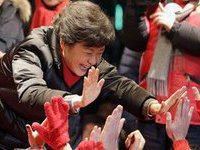South Korean woman gets ready to rule the country of men
Not that long ago, Park Geun-hye won the presidential election in South Korea in a bitter struggle to become the first woman to head one of the countries of the Far East. Like many of her predecessors in Asia (Indira Gandhi, Benazir Bhutto, Corazon Aquino), she rose to power owing to political legacy of a man from her clan. However, many experts predict a brilliant career for Park.

South Korea is a presidential republic, where the president is elected for the term of 5 years. In the elections of December 19, Park Geun-hye, who heads the conservative party Senuri, defeated the leader of the United Democratic Party, Moon Jae-in, by a margin of one million votes. The 60-year-old daughter of the dictator apologized for her father during the election campaign. General Park Chung-hee seized power in Seoul in 1961 as a result of a military coup. However, he is considered the father of the South Korean economic miracle, and voters hope that his daughter will do something like that too to take the country out of crisis. "I promised to be a president of common people, and I will. This victory gives people a hope to overcome the crisis," said Park Geun-hye.
Park was born on February 2, 1952 in Daegu into the family of the would-be 9th President of South Korea (1963 - 1979). In 1953, the family moved to Seoul. Pak is an electrical engineer by education - she graduated from the Seoul National University.
The fate of her parents was tragic. In 1974, her mother died as a result of a failed assassination attempt on her father. Having become the widower, Park Chung did not get married again, and the role of the First Lady was informally passed to his eldest daughter, also named Park (she was 22 at the time). In 1979, her father was killed by North Korean secret services - at least according to the official version. As an independent politician Park Geun-hye appeared after the 1998 financial crisis.
In 1998, she was elected as a deputy to the National Assembly (Parliament) of South Korea's Grand National Party (PVA), on one of the districts of Daegu. In 2011, in connection with the decline of the popularity rating, PVA party formed the Emergency Committee and changed the name to Senuri (Party of New Horizons).
On December 19, 2011 Park Geun-hye became its leader. After Senuri won a landslide victory at the parliamentary elections, she put forward her candidacy for presidential election.
Park has never been married and has no children. Women in South Korea, a traditionally Confucian country, take 15 percent of seats in parliament, and only 12 percent on executive positions in 1,500 major companies. In addition, South Korean women earn about 40 percent less than men do. This is one of the largest pay gaps by gender in the world according to the Organization for Economic Cooperation and Development (OECD). Therefore, the election of a woman for the post of the head of state, where men dominate politics and business, is a real historical breakthrough.
Park Geun-hye has never been a feminist. In her election campaign, women's rights did not make the cornerstone of her program. She paid first priority attention to the country's economic revival. Despite the so-called "Korean economic miracle", the global crisis became a serious blow to the South Korean economy, heavily export-oriented. This year, GDP grew by only 2 percent after more than a decade of progress of 5 percent.
The new South Korean leader has realized herself as a politician and enjoys great respect in the country. "After the assassination of Park Chung-hee in 1979, she has been building her political brand alone. For the time being, it is still unknown how Park will develop as a leader, but she is not just a figure that came to power only because she is the daughter of a famous father," Jung Mi Ae, a Kookmin university professor told AFP.
In foreign policy, the Conservative leader said that her priority would be to strengthen the military and trade relations with the United States, which she described as a major partner of South Korea. Relations with North Korea did not take a prominent place in her election platform. According to Jung Mi Ae, North Korea dominates the minds of the international community to a much greater extent than those of South Korean politicians. Park Geun-hye called a "provocation" the launch of the North Korean satellite, but it is expected that her policy would be aimed at improving relations with the country, that were nearly frozen by the previous government. She promised to protect the country from "external threats", referring to the dispute with Japan over Tokdo / Takeshima. It will be interesting to see in this context how South Korea's relationship will develop with new politicians of the region, Kim Jong-Un of North Korea, Xi Jinping of China and Shinzo Abe of Japan, who also enjoy the reputation of bright national leaders.
Lyuba Lulko
Pravda.Ru
Subscribe to Pravda.Ru Telegram channel, Facebook, RSS!


